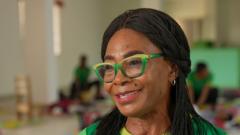In Nigeria, the challenges facing families with children afflicted by cerebral palsy are significant, but one woman's mission is turning the tide. Nonye Nweke, after struggling to find appropriate care for her own daughter, Zimuzo, opened the Cerebral Palsy Centre in Lagos ten years ago. With Zimuzo now a resilient 17 years old, the center has become a sanctuary for children with cerebral palsy, each requiring extensive medical and emotional support.
Cerebral palsy, often the result of untreated neonatal jaundice, affects a staggering number of individuals in Nigeria. Medical experts suggest that as many as 700,000 people could be living with this neurological disorder, often exacerbated by systemic healthcare deficiencies. Despite accessible treatment for neonatal jaundice being straightforward, a lack of resources and awareness means many children go untreated, leading to lifelong complications.
As Ms. Nweke passionately explains, the stigma surrounding disabilities in Nigeria can also be disheartening. Many families believe that children with conditions like cerebral palsy are spiritually cursed, leading to further isolation and abandonment. In the face of these adversities, the Cerebral Palsy Centre operates with a limited capacity, currently caring for 12 children. Yet, there’s a staggering waiting list of over 100 families seeking help.
While addressing the emotional and financial burdens encountered, Ms. Nweke highlights the prohibitive costs associated with caring for children with severe disabilities. An average monthly care cost of $1,000 in a country where the minimum wage is just $540 annually is staggering.
To combat the widespread issue of neonatal jaundice, initiatives such as Project Oscar have emerged. Launched in Lagos, this project aims to provide resources and training to healthcare facilities to enable better screening and treatment for newborns suffering from jaundice. With plans to reach thousands of families in the coming year, Project Oscar represents a glimmer of hope in a healthcare system strained by limited funding and overburdened services.
Though the road ahead remains filled with challenges, advocates like Ms. Nweke and organizations like Project Oscar are determined to break the cycle of neglect surrounding cerebral palsy in Nigeria. Their commitment to spreading awareness and ensuring all children receive the care they deserve is paving the way for a brighter future for those impacted by this debilitating condition.
Cerebral palsy, often the result of untreated neonatal jaundice, affects a staggering number of individuals in Nigeria. Medical experts suggest that as many as 700,000 people could be living with this neurological disorder, often exacerbated by systemic healthcare deficiencies. Despite accessible treatment for neonatal jaundice being straightforward, a lack of resources and awareness means many children go untreated, leading to lifelong complications.
As Ms. Nweke passionately explains, the stigma surrounding disabilities in Nigeria can also be disheartening. Many families believe that children with conditions like cerebral palsy are spiritually cursed, leading to further isolation and abandonment. In the face of these adversities, the Cerebral Palsy Centre operates with a limited capacity, currently caring for 12 children. Yet, there’s a staggering waiting list of over 100 families seeking help.
While addressing the emotional and financial burdens encountered, Ms. Nweke highlights the prohibitive costs associated with caring for children with severe disabilities. An average monthly care cost of $1,000 in a country where the minimum wage is just $540 annually is staggering.
To combat the widespread issue of neonatal jaundice, initiatives such as Project Oscar have emerged. Launched in Lagos, this project aims to provide resources and training to healthcare facilities to enable better screening and treatment for newborns suffering from jaundice. With plans to reach thousands of families in the coming year, Project Oscar represents a glimmer of hope in a healthcare system strained by limited funding and overburdened services.
Though the road ahead remains filled with challenges, advocates like Ms. Nweke and organizations like Project Oscar are determined to break the cycle of neglect surrounding cerebral palsy in Nigeria. Their commitment to spreading awareness and ensuring all children receive the care they deserve is paving the way for a brighter future for those impacted by this debilitating condition.



















